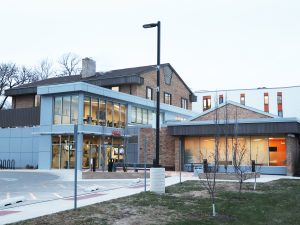Collaborative gets funding to help homeless families
By Igor Studenkov For Chronicle Media — December 18, 2024
The YWCA Evanston/North Shore is an Alliance to End Homelessness in Suburban Cook County member. (Photo by Igor Studenkov/for Chronicle Media)
An organization that works to reduce homelessness in suburban Cook County has received a $2.5 million grant from a charitable fund set up by Jeff Bezos.
Since 2018, the Bezos Day 1 Fund has been issuing grants to nonprofits that help families experiencing homelessness, as well as to nonprofits looking to set up preschools in low-income communities.
The Alliance to End Homelessness in Suburban Cook County falls in the former category. As the name suggests, it is a collaborative of 40 nonprofit entities that works to help suburbanites who are experiencing homelessness find and keep permanent housing.
According to Jennifer Hill, Alliance executive director, the funding comes “at an opportune time.” Since the pandemic, suburban providers have pivoted from using churches as emergency shelters to setting up more purpose-built solutions, such as buying up hotels and buildings. Federal pandemic response stimulus funding, which helped them through the shift, is starting to run out, and the Day 1 grant will help keep the transition going.
As Chronicle Media has reported over the years, homelessness in the suburbs has flown under the radar, but it got more attention during the COVID-19 pandemic. Under the standards set by the federal government, individuals are homeless if they don’t have a housing unit to call their own. This encompasses individuals who don’t have any kind of shelter, those who stay in an overnight shelter, those who sleep in the cars and those who temporarily stay with their friends or relatives.
Every year, Alliance and other organizations conduct a Point-of-View count, which tries to get a snapshot of homelessness on one particular day to get some sense of how many individuals experience it. The 2024 count recorded 1,188 homeless suburbanites in Cook County, 114 of whom had no shelter of any kind. The overall number represents a 13 percent increase compared to last year. According to the breakdown of the statistics provided by the Alliance, the number of homeless families increased by 12 percent.
The Alliance pointed to 2024 report from the National Alliance to End Homelessness, which showed that family homelessness in the U.S. rose dramatically from 2022 to 2023, and families now represent more than 28 percent of the country’s homeless population.
This year, Day 1 Fund issued a total of $110.5 million in grants to 40 organizations, The Alliance is the only 2024 Day 1 Families Fund grantee from Illinois.
Hill said that $2 million of Day 1 funding will go to the 40 providers who make up the Alliance. The remaining $500,000 will be used for the administrative costs. The $2 million is expected to last five years, and it will be used for a wide variety of services.
Hill explained that Alliance members try to help residents avoid having to go to shelter by, for example, paying off their utility bills, helping them find new housing or even paying for a ticket to get them to family members in another state who can take them in.
“It’s doing some problem-solving, so you don’t have to enter shelter in order to resolve your housing crisis,” she said.
If the person does end up needing shelter, the Alliance members help find some short-term solutions, while also looking for long-term solutions. That requires working with suburban landlords and affordable housing providers.
“We want to move as many people as quickly as possible into housing of their own,” Hill said.
Another important component is to make sure that residents get support every step of the way, whether it is to help find jobs, set up bank accounts, get treatment for physical or mental health issues, and otherwise address obstacles they may face. For families, finding affordable daycare is a major issue.
In a statement to the media, Alliance board member Monique Williams said that she knew firsthand just how much of a difference those services could make.
“Having personally experienced the challenges of homelessness, I understand the depth and profound impact this funding will have on families at a time when housing affordability continues to be a critical issue in our community,” she said.
According to the Alliance fact sheet, it receives around $25 million a year in federal funding. Hill said that getting around $500,000 a year is still significant. It will allow the Alliance to expand services to families and “help bring to scale innovative housing solutions for families” experiencing homelessness.
Before the pandemic, suburban organizations tended to direct someone who needs emergency overnight shelter to Public Action to Deliver Shelter sites in churches and nonprofit organizations. When the stay-at-home orders shut those organizations down, Alliance members scrambled to get clients into hotels, where they could socially distance and self-isolate.
As the pandemic wound down, the organizations started thinking of more permanent solutions,
“We have to essentially rebuild the significant portion of our system from the ground up,” Hill said. “Some of that involves acquiring those hotels and using them as homeless shelters in an ongoing way. Sometimes, it means securing other types of buildings, so we can have some fixed-site shelter occupancy.”
She said that this is still an ongoing process.
“As the pandemic recovery funding sources are starting to dry up, this funding can [be used] to fill some of the gap as we transform our system to what it needs to look like for decades to come,” Hill said.






